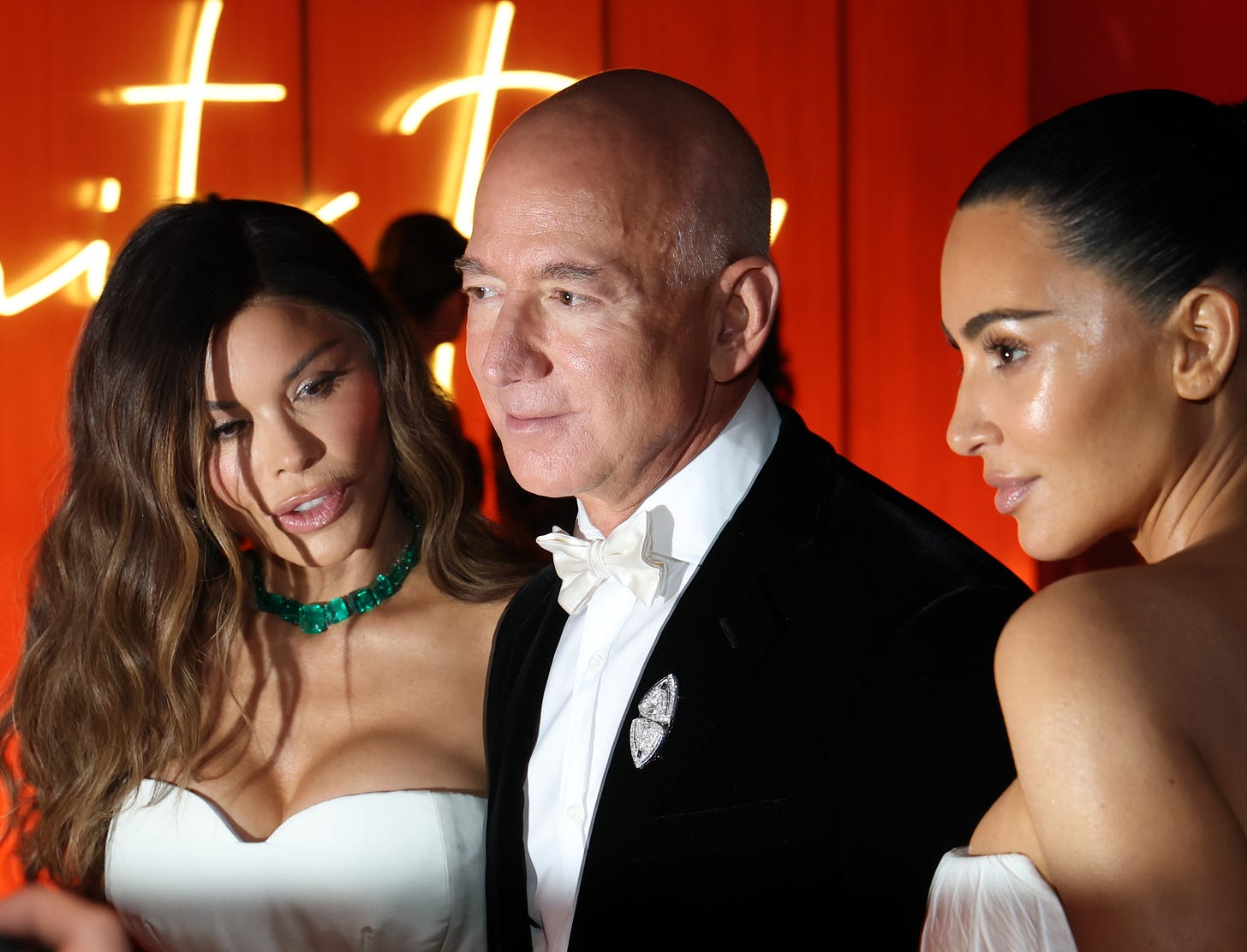All the Things That You Need a Billion Dollars to Buy Are Bad
One way to think about inequality.
America’s 1,135 billionaires make up 0.0003% of the country’s population. Collectively, they own $5.7 trillion, about 4% of the nation’s wealth. Their comrades in the top 0.1% of the wealth distribution—a group you can enter with a paltry $50 million—own 14% of the nation’s wealth. The top 1% of the wealth distribution owns 31% of the nation’s wealth. The top ten percent owns two-thirds of the nation’s wealth. The bottom half of the wealth distribution in America owns 2.5% of the wealth. Effectively nothing.
Imagine saying “every person in this country is going to be equal” and then also saying “several hundred people will own significantly more wealth than 65 million entire households.” Kind of ridiculous, no? It does not take sophisticated analytical thinking to understand this. The numbers tell the story. Take a billionaire and a person living paycheck to paycheck to the US Capital and see who the Congressmen open their doors for. Money buys political power, and far too few people have too much money, and therefore the political power is wildly skewed, and therefore what we colloquially refer to as “our democracy” does not work.
A new poll “finds that the share of people who say they have a good chance of improving their standard of living fell to 25%, a record low in surveys dating to 1987.” And yet America is the richest country in the history of the world. What gives? What gives is that all of the wealth is not being shared with all of the people. The single most effective way to make a lot of money is: Have a lot of money already, and invest it. You can work long, hard hours in a difficult job for your entire life and not make as much money as a billionaire can make in one day by doing nothing except watching a line on an investment chart go up. This strikes most people as unfair. This unfairness puts people in a pessimistic mood. Unsurprisingly.
When you think about all of the bad things that our government is doing today, it is imperative that you keep fixed in your mind the fact that our unequal distribution of wealth, and therefore of political power, is what led us to this point. If we do not fix that distribution, we are going to continue limping forward under the weight of a toxic system. Band-aids are sometimes necessary, yes, but only until you can do the surgery. The war on science, the war on democracy, the war on constitutional norms, the war on immigrants—all of these things are branches of the class war, because losing the class war is what granted the bad people the power to pursue those things in such an unchecked manner.
Inequality is the root of America’s problems. You can view this as “too few people have too much” or “too many people have too little” but the dynamic that captures both of those things is “inequality is too high.” We need to reduce inequality. That can be done by taking wealth away from the rich, or giving wealth to the poor, or—quickest of all—by taking wealth away from the rich and giving to the poor.
Coming up with policies that would do these things is not hard. The 400 wealthiest billionaires in America pay an effective tax rate of 24%, whereas the full population pays an average of 30%. There’s an idea. Right there. Tax them. My point is that the difficult part of this problem is not figuring out “what should be done about this?” The hard part is bringing about the conditions in the world that would cause such policies to be implemented.
The main reason that it is hard to reduce inequality is that rich people do not want to give up their money. They are willing to spend a lot of money in order to maintain their advantages, as long as the money they spend is less than the money they might lose if they did not spend the money. So the rich fund an entire universe of think tanks and lobbyists and educational programs and so on and so on, all with the underlying purpose of keeping public outrage at their existence to a minimum. It is important—even existential—for the rich to ensure that the idea that they are entitled to what they have is cemented in the mind of the larger public. Much of “public discourse” in America is in reality the operation of this project, and the backlash to it. The rich must win the battle for the hearts and minds of the general public not because they care about the public welfare, but because they care about their own. Historically, losing this intellectual battle is what has gotten rich people led to the guillotines. And those that were guillotined were not nearly as rich as our rich people today.
This issue is one that touches virtually everything, and it is not easily resolved. If you write about an issue like this, the challenge becomes: How do you continually come up with ways to impress upon people the urgency of a state of affairs that has probably not changed that much since the last time you wrote about it? It is not as though you can write one story about a concept like “poverty exists” or “rich people are too rich” or “inequality is undermining democracy” and then clap your hands and say, “Well, we covered that!” No. This issue was here before I was born and has been here throughout my entire career and will be here when I die. We are all part of a grand struggle to pull on a rope that tugs a boulder a little ways in the right direction.
There is a very large portion of the non-rich American public that more or less buys the arguments of the rich. Many people have a strongly held belief that people are entitled to make money, and do what they want with that money. You may think that these people are deceived, or that they are self-loathing, or that they are fundamentally selfish, but the fact remains that the task of turning the ship of American wealth distribution is going to involve convincing more of these people that billionaires are bad, rather than that being a billionaire is something to be aspired to. Those of us who are engaged in trying to reframe people’s beliefs on this stuff often spend our time presenting these issues from slightly different angles, over and over, to see what resonates.
Let me tell you one way I have been thinking about this lately. You might say “Billionaires should not exist,” and someone replies “They are entitled to their money, and the government has no right to steal it, and making money is key American freedom,” and other familiar objections. Statistical inequality is usually not enough to puncture these objections, which rest on a particularly American idea of fairness. What to do?
How about this: With $999 million, you can buy everything you want. Mansions. Yachts. Jewelry. Cars. All of the trappings of wealth. All the stuff you have ever dreamed about. You can have all of these things. Eliminating billionaires would not eliminate anyone’s ability to live the Rich Person Dream Life that fuels so many people’s fantasies.
All of the stuff that you need more than a billion dollars to buy is stuff that it is bad for you to be able to buy. Stuff that we do not want you to be able to buy. Unfair power over other people. The ability to impose your will on others. The ability to override the democratic process. It is understandable that people think that fairness demands that people be allowed to achieve the American dream of getting rich and living a lavish lifestyle. Fine. But a billion dollars—or ten billion, or a hundred billion, or four hundred billion—are not necessary for that lavish lifestyle. The only thing that that amount of wealth is necessary for is the domination of others. In other words, at a certain point, wealth shifts from being something that enables freedom to something that can only be used to take freedom away from the public.
You and I may believe that the amount of wealth any individual should have in a fair world is far less than $999 million. But let us recognize that it would be a significant accomplishment to win the public debate on the basic proposition, “There is *some amount* of wealth that it is bad for a person to have.” If it is the case that there is some amount of wealth that cannot be used for purchasing anything socially useful, and can only be used to purchase things that are detrimental to the public good, it stands to reason that that would be a good line to draw on accumulation of wealth. In a nation where a dozen men each have fortunes of more than $100 billion, any line at all on wealth would represent a drastic blow against inequality.
We’ll keep working.
More
Related reading: Enough Wealth to Warp the Universe; The Underlying Problem; Confiscate Their Money.
You can never read too much or talk too much or make enough noise about the class war. Sign up for the Economic Hardship Reporting Project’s newsletter. Read my book, “The Hammer.” This week, I was on the Bad With Money podcast with Gabe Dunn talking about unions—you can listen to that here. On September 20, I’ll be speaking in Atlanta at the annual Douglass-Debs dinner—tickets are here. And please, unionize your workplace.
Independent media is important. Thank you for reading How Things Work. This publication is not supported by any billionaires—dang! Instead, it is 100% funded by readers just like you who decide that it is worth kicking in a few bucks to help this place keep going. If you have been reading for a while and are ready to do your part to support How Things Work, please take a quick second and become a paid subscriber right now. It’s six bucks a month or sixty bucks a year and it comes with good karma. We would not exist without you all.




I have met plenty of wealthy people and their cheapness always astounds me. There are things they will spend on but they are often poor tippers, donate percentage-wise less of their money, and will always fight for a deal on anything. And don't get me started on the taxes.
I recently read Paul Vigna's book The Almightier, which talks about the idea of wealth as magnificence, that those with wealth have the duty to spend it in a way that benefits the greater populace. There is no longer a societal push to do anything with money other than hoard it for one's own benefit.
My small part in this is to periodically share something I heard a while back. I don’t think people realize just how much $1B really is, but most people do get how much $100K is. So, if you could spend $100K per day (!), it’d take over 27 years to spend $1B!